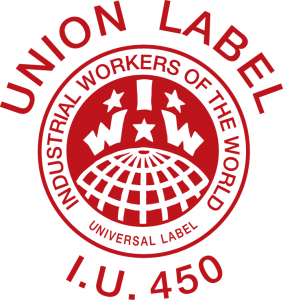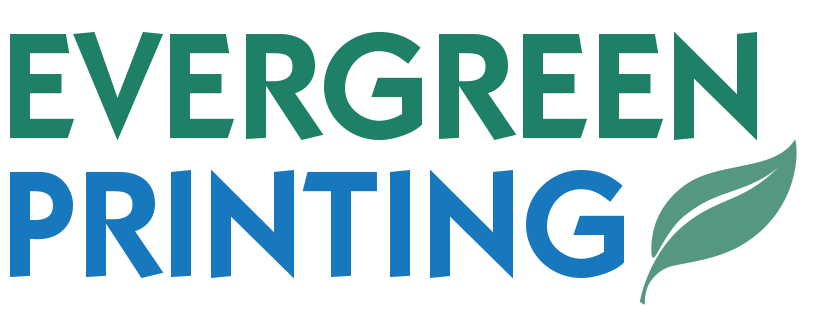Evergreen Printing is an Industrial Workers of the World (IWW) union shop and I have been a member of the Union for over 30 years. I chose the IWW because of its participatory democratic structure, its vision for a more just society, and its rich history of organizing people who need it the most. Since its founding in 1905, the IWW has welcomed women, people of color, and immigrants into the Union as equals, with many playing prominent leadership roles.
 A union “bug” (or label) signifies that the work performed was done by union workers who collectively exercise some level of control over their working lives. This control usually translates into higher wages, better working conditions, a safer workplace, greater job security, and more dignity on the job. I can print the union bug on your job or not. It’s your choice. However, some people look for the union label on products and understand it as a reflection that the product was made in a relatively ethical manner.
A union “bug” (or label) signifies that the work performed was done by union workers who collectively exercise some level of control over their working lives. This control usually translates into higher wages, better working conditions, a safer workplace, greater job security, and more dignity on the job. I can print the union bug on your job or not. It’s your choice. However, some people look for the union label on products and understand it as a reflection that the product was made in a relatively ethical manner.
Does it make sense for a one-person operation to be a union shop? Absolutely. In my case, the level of control I exercise at work is complete and I do not employ anyone else. Although not a traditional employer-employee relationship, the IWW Constitution allows both sole proprietors and worker cooperatives (worker owned and managed businesses) to become IWW union shops if they meet and maintain certain standards. I have been printing for over 29 years, the first 10 years in a worker cooperative and the rest as a sole proprietor, both as IWW union shops.
Being a union printer means more than just my labor. It also means using union-made products and services whenever I can and avoiding companies with poor labor relations. Paper is, by far, the most widely used material in the printing process and I prioritize purchasing union-made paper. Over 95% of the paper I print on is union-milled in the United States by members of the United Steelworkers (USW). Some of the office workers at paper companies are also unionized with the Office and Professional Employees International Union (OPEIU). In the printing industry, “paper merchants” are the intermediary distributors between paper mills and print shops. Paper merchants transport paper from mills, warehouse it, and deliver it to local print shops across the country. I deal with a few paper merchants and all local merchant warehouse workers and drivers are unionized with various locals of the Teamsters.
Being a union printer also means supporting working people around the world and resisting trade practices that damage communities. When I can’t find the highest processed chlorine-free, post-consumer recycled content paper made domestically, I will sometimes buy paper milled in other countries if I am able to assess their labor and environmental practices. I have printed on paper milled in Canada, Germany, Italy, and Japan. I avoid mills if I cannot assess their labor and environmental practices. Moreover, I will not purchase paper that is dumped onto the U.S. market or buy paper from a U.S. company that dumps paper onto another country. “Dumping” is the illegal practice of selling a product abroad at below cost to gain a larger market share or to drive domestic producers out of business. I now see foreign-milled, supposedly 100% processed chlorine-free, post-consumer recycled paper being sold in the U.S. for 30-50% below what I pay for domestically-milled 100% processed chlorine-free, post-consumer recycled paper. Despite feeling pressure from customers to keep prices low, I refuse to buy this dumped paper because I cannot assess the working conditions of the people who milled it, verify the environmental caliber of the paper, and because this practice has a destructive impact on the American manufacturing sector.
Evergreen Printing is an Industrial Workers of the World (IWW) union shop and I have been a member of the Union for over 30 years. I chose the IWW because of its participatory democratic structure, its vision for a more just society, and its rich history of organizing people who need it the most. Since its founding in 1905, the IWW has welcomed women, people of color, and immigrants into the Union as equals, with many playing prominent leadership roles.
A union “bug” (or label) signifies that the work performed was done by union workers who collectively exercise some level of control over their working lives. This control usually translates into higher wages, better working conditions, a safer workplace, greater job security, and more dignity on the job. I can print the union bug on your job or not. It’s your choice. However, some people look for the union label on products and understand it as a reflection that the product was made in a relatively ethical manner.
Does it make sense for a one-person operation to be a union shop? Absolutely. In my case, the level of control I exercise at work is complete and I do not employ anyone else. Although not a traditional employer-employee relationship, the IWW Constitution allows both sole proprietors and worker cooperatives (worker owned and managed businesses) to become IWW union shops if they meet and maintain certain standards. I have been printing for over 29 years, the first 10 years in a worker cooperative and the rest as a sole proprietor, both as IWW union shops.
Being a union printer means more than just my labor. It also means using union-made products and services whenever I can and avoiding companies with poor labor relations. Paper is, by far, the most widely used material in the printing process and I prioritize purchasing union-made paper. Over 95% of the paper I print on is union-milled in the United States by members of the United Steelworkers (USW). Some of the office workers at paper companies are also unionized with the Office and Professional Employees International Union (OPEIU). In the printing industry, “paper merchants” are the intermediary distributors between paper mills and print shops. Paper merchants transport paper from mills, warehouse it, and deliver it to local print shops across the country. I deal with a few paper merchants and all local merchant warehouse workers and drivers are unionized with various locals of the Teamsters.
Being a union printer also means supporting working people around the world and resisting trade practices that damage communities. When I can’t find the highest processed chlorine-free, post-consumer recycled content paper made domestically, I will sometimes buy paper milled in other countries if I am able to assess their labor and environmental practices. I have printed on paper milled in Canada, Germany, Italy, and Japan. I avoid mills if I cannot assess their labor and environmental practices. Moreover, I will not purchase paper that is dumped onto the U.S. market or buy paper from a U.S. company that dumps paper onto another country. “Dumping” is the illegal practice of selling a product abroad at below cost to gain a larger market share or to drive domestic producers out of business. I now see foreign-milled, supposedly 100% processed chlorine-free, post-consumer recycled paper being sold in the U.S. for 30-50% below what I pay for domestically-milled 100% processed chlorine-free, post-consumer recycled paper. Despite feeling pressure from customers to keep prices low, I refuse to buy this dumped paper because I cannot assess the working conditions of the people who milled it, verify the environmental caliber of the paper, and because this practice has a destructive impact on the American manufacturing sector.
